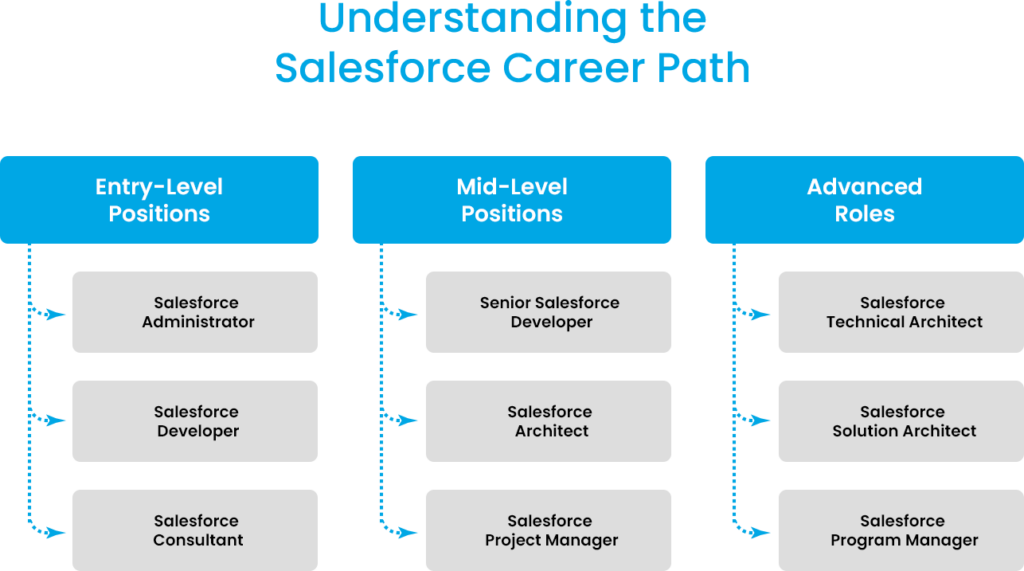Are you a student, or have you just gotten the graduation certificate and are facing indecision on which career path to choose? In a world where jobs are becoming more and more competitive and dynamic, it’s paramount to opt for a career path that not only offers security and advancement but also along with has an interest in and fulfils one’s aspirations.
Amidst this evolving landscape, the Salesforce career path emerges as a beacon of promise and opportunity. In this blog, we will explore together this fascinating territory of Salesforce experiences, addressing those common worries, seeing the career potential, and gaining valuable insights to make you begin your road through the Salesforce-owned world.
Embracing the Salesforce Revolution
Digitalisation has dramatically changed the way companies function in the 21st century, with CRM systems becoming one of the core factors that underpin business growth and success. CRM innovation reaches its peak with Salesforce, a cloud-based platform that provides organisations with the possibility to engage with their customers in a wholly new way.
Salesforce is being adopted by businesses around the world and used for smooth workflows and better customer experience. Thus, there is a noticeable shortage of skilled Salesforce professionals.
Is Salesforce a good career path?
A career in Salesforce offers unparalleled opportunities for growth and advancement in a thriving industry. With high demand across various sectors, mastering Salesforce can pave the way for a rewarding and lucrative career path.
High Demand
The popularity of pursuing a Salesforce career path stems from its widespread demand across diverse business sectors. Career growth in Salesforce is dynamic and multifaceted, presenting abundant opportunities for progression into leadership positions, specialisation in specific areas, and venturing into consulting or entrepreneurship.
Across startups to Fortune 500 enterprises, organisations leverage Salesforce to achieve operational excellence and drive business growth in industries spanning technology, healthcare, finance, and retail.
According to Salesforce itself, the Salesforce ecosystem is expected to create 9.3 million jobs by 2026.
Lucrative Opportunities
Salesforce is renowned for providing lucrative job opportunities, given its rising demand and specialised skill prerequisites. Professionals proficient in Salesforce often enjoy competitive salaries and appealing compensation packages. Their expertise is highly coveted for its crucial role in fostering business success. Acknowledging the value of these skills, organisations heavily invest in attracting and retaining top talent.
Trailhead recently revamped its user interface and learning paths, further enhancing the accessibility and effectiveness of Salesforce training resources for aspiring professionals.
Diverse Job Roles
A significant draw of pursuing a career in Salesforce lies in its array of diverse job roles tailored to individuals with varying skill sets and interests. Whether one’s passion lies in data analysis, software development, or strategic consulting, the Salesforce ecosystem offers a fitting role. Spanning from entry-level positions to advanced leadership roles, the opportunities are virtually boundless.
Understanding the Salesforce Career Path

Entry-Level Positions: Launching Your Salesforce Journey
For aspiring Salesforce professionals just starting their journey on the Salesforce career path, entry-level positions serve as the gateway to a rewarding career. These roles typically involve foundational tasks such as system configuration, data management, and user support. Common entry-level job titles include:
> Salesforce Administrator
Responsible for managing and configuring the Salesforce platform to meet business needs.
> Salesforce Developer
Specialises in building custom applications and integrations using programming languages like Apex and JavaScript.
> Salesforce Consultant
Works closely with clients to understand their requirements and design solutions that maximise the value of the Salesforce platform.
Mid-Level Positions: Scaling the Career Ladder
As you gain experience and expertise in the Salesforce domain, mid-level positions offer opportunities for career advancement and expanded responsibilities. Mid-level roles require a deeper understanding of Salesforce best practices, advanced technical skills, and the ability to lead complex projects.
> Senior Salesforce Developer
Responsible for leading and mentoring junior developers while also tackling complex development tasks to enhance the Salesforce ecosystem.
> Salesforce Architect
Designs and implements scalable and robust Salesforce solutions that align with business objectives and industry best practices.
> Salesforce Project Manager
Oversees the planning, execution, and delivery of Salesforce projects, ensuring they are completed on time, within budget, and to the client’s satisfaction.
Advanced Roles: Mastering the Art of Salesforce Leadership
For seasoned professionals seeking to carve out a niche at the pinnacle of their Salesforce career, advanced roles beckon with the promise of leadership, innovation, and strategic impact. Advanced role professionals play a pivotal role in shaping organisational strategy, driving digital transformation, and delivering transformative solutions that propel businesses forward.
> Salesforce Technical Architect
Tasked with designing and implementing complex technical solutions within the Salesforce platform, leveraging extensive knowledge of architecture and development best practices.
> Salesforce Solution Architect
Works closely with clients to understand their business needs and design comprehensive solutions that leverage the full potential of the Salesforce ecosystem.
> Salesforce Program Manager
Oversees the coordination and execution of multiple Salesforce projects within an organisation, ensuring alignment with strategic goals and delivering measurable business value.
Learning Salesforce: Skills and Resources
Essential Skills: Building Your Salesforce Arsenal
To thrive in a Salesforce career, you must possess a diverse skill set that encompasses technical expertise, business acumen, and adept problem-solving capabilities. Crucial skills include mastering the Salesforce CRM platform, proficiency in programming languages like Apex and JavaScript, and a profound understanding of business processes and requirements.
Training Resources: Your Pathway to Salesforce Mastery
Fortunately, an array of training resources is available to help you acquire and hone your Salesforce skills. Whether you prefer self-paced online courses, interactive learning modules, or hands-on workshops, platforms like Trailhead by Salesforce offer a wealth of educational resources tailored to learners of all levels. Pursuing Salesforce certifications can also strengthen your credentials and demonstrate your expertise to potential employers.
Overcoming Challenges in Pursuing a Salesforce Career
Skill Gap
A significant challenge for aspiring Salesforce professionals is bridging the gap between academic knowledge and real-world experience. To surmount this obstacle, actively pursue opportunities to apply your skills in practical settings, such as internships, volunteer projects, or freelance engagements.
Tap into online communities and forums to connect with seasoned professionals, gaining valuable insights into industry best practices.
Experience Requirements
Many entry-level Salesforce roles require prior experience, creating a catch-22 situation for recent graduates seeking to enter the field. To acquire practical experience, contemplate offering your services pro bono (for the public good) to non-profit organisations, engaging in hackathons or coding competitions, participating in virtual internships, or contributing to open-source projects.
These endeavours not only augment your skill set but also showcase your enthusiasm and proactivity to prospective employers.
Competitive Job Market
In a highly competitive job market, distinguishing yourself is crucial for securing sought-after Salesforce opportunities. Take proactive measures to set yourself apart by cultivating a robust online presence. Showcase your projects and accomplishments on platforms such as LinkedIn or your trailblazer profile.
Network with industry professionals by attending events, and meetups, and participating in online forums. These efforts can significantly enhance your visibility and appeal to potential employers.
Networking Challenges
Networking may seem daunting for students and recent graduates, yet fostering connections within the Salesforce community is vital for career progression. Attend local user group meetings, participate in online communities like the Salesforce Success Community or Reddit’s r/salesforce, and actively seek mentors who can provide valuable guidance and support as you navigate your journey in Salesforce.
These interactions not only expand your professional network but also offer opportunities for learning and growth within the industry.
Resource Accessibility
Accessibility to learning resources can pose a significant barrier for individuals from underprivileged backgrounds or non-traditional educational paths. Fortunately, a few initiatives are working to democratise access to Salesforce learning opportunities, providing scholarships, mentorship, and offline/online training to aspiring professionals from diverse backgrounds.
Conclusion
In summary, a career in Salesforce presents an avenue for unparalleled growth, opportunity, and fulfilment. Whether you’re starting your educational journey or contemplating a career shift, the Salesforce career path holds vast promise and potential. By acquiring the necessary skills, utilising available resources, and embracing the strength of community and networking, you can embark on a transformative path towards a rewarding and impactful career in Salesforce.
So why wait? Seize the opportunity and unlock your future in the exciting world of Salesforce today!











